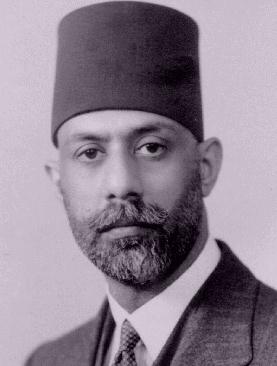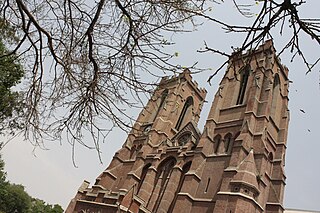
The Partition of India in 1947 was the change of political borders and the division of other assets that accompanied the dissolution of the British Raj in the Indian subcontinent and the creation of two independent dominions in South Asia: India and Pakistan. The Dominion of India is today the Republic of India, and the Dominion of Pakistan—which at the time comprised two regions lying on either side of India—is now the Islamic Republic of Pakistan and the People's Republic of Bangladesh. The partition was outlined in the Indian Independence Act 1947. The change of political borders notably included the division of two provinces of British India, Bengal and Punjab. The majority Muslim districts in these provinces were awarded to Pakistan and the majority non-Muslim to India. The other assets that were divided included the British Indian Army, the Royal Indian Navy, the Royal Indian Air Force, the Indian Civil Service, the railways, and the central treasury. Provisions for self-governing independent Pakistan and India legally came into existence at midnight on 14 and 15 August 1947 respectively.

Choudhry Rahmat Ali was a Pakistani nationalist who was one of the earliest proponents of the creation of the state of Pakistan. He is credited with creating the name "Pakistan" for a separate Muslim homeland in South Asia and is generally known as the originator of the Pakistan Movement.

The Pakistan Movement was a political movement in the first half of the 20th century that aimed for the creation of Pakistan from the Muslim-majority areas of British India. It was connected to the perceived need for self-determination for Muslims under British rule at the time. Muhammad Ali Jinnah, a barrister and politician led this movement after the Lahore Resolution was passed by All-India Muslim League on 23 March 1940.

The Radcliffe Line was the boundary demarcated by the two boundary commissions for the provinces of Punjab and Bengal during the Partition of India. It is named after Cyril Radcliffe, who, as the joint chairman of the two boundary commissions, had the ultimate responsibility to equitably divide 175,000 square miles (450,000 km2) of territory with 88 million people.
The Indian Civil Service (ICS), officially known as the Imperial Civil Service, was the higher civil service of the British Empire in India during British rule in the period between 1858 and 1947.

Sir Malik Khizar Hayat TiwanaKCSI, OBE was an Indian statesman, landowner, army officer, and politician belonging to the Punjab Unionist Party. He served as the prime minister of the Punjab Province of British India between 1942 and 1947. He opposed the Partition of India and the ideology of Muslim League. He was eventually ousted from office by the Muslim League through a civil disobedience campaign, plunging Punjab into communal violence that led to the partition of the province between India and Pakistan.

Christianity is the third largest religion in Pakistan, making up about 1.37% of the population according to the 2023 Census. Of these, approximately half are Catholic and half Protestant. A small number of Eastern Orthodox Christians, and Oriental Orthodox Christians also live in Pakistan.

The Dominion of India, officially the Union of India, was an independent dominion in the British Commonwealth of Nations existing between 15 August 1947 and 26 January 1950. Until its independence, India had been ruled as an informal empire by the United Kingdom. The empire, also called the British Raj and sometimes the British Indian Empire, consisted of regions, collectively called British India, that were directly administered by the British government, and regions, called the princely states, that were ruled by Indian rulers under a system of paramountcy. The Dominion of India was formalised by the passage of the Indian Independence Act 1947, which also formalised an independent Dominion of Pakistan—comprising the regions of British India that are today Pakistan and Bangladesh. The Dominion of India remained "India" in common parlance but was geographically reduced. Under the Act, the British government relinquished all responsibility for administering its former territories. The government also revoked its treaty rights with the rulers of the princely states and advised them to join in a political union with India or Pakistan. Accordingly, the British monarch's regnal title, "Emperor of India," was abandoned.
A cabinet mission went to India on 24 March 1946 to discuss the transfer of power from the British government to the Indian political leadership with the aim of preserving India's unity and granting its independence. Formed at the initiative of British Prime Minister Clement Attlee, the mission contained as its members, Lord Pethick-Lawrence, Sir Stafford Cripps, and A. V. Alexander. The Viceroy of India Lord Wavell participated in some of the discussions.
Protestants in India are a minority and a sub-section of Christians in India and also to a certain extent the Christians in Pakistan before the Partition of India, that adhere to some or all of the doctrines of Protestantism. Protestants in India are a small minority in a predominantly Hindu majority country, but form majorities in the north-eastern states of Meghalaya, Mizoram and Nagaland and significant minorities in Konkan division, Bengal, Kerala and Tamil Nadu, with various communities in east coast and northern states. Protestants today trace their heritage back to the Protestant reformation of the 16th century. There are an estimated 20 million Protestants and 16 million Pentecostals in India.

Protestants are in a minority of less than 1.5% of the population of Pakistan. It is the largest Christian denomination in the country, followed by the Catholics. Most of the Protestant population resides in urban areas of the Punjab province.

After the Indian Rebellion of 1857, the British Government took over the administration to establish the British Raj. The British Raj was the period of British Parliament rule on the Indian subcontinent between 1858 and 1947, for around 89 years of British occupation. The system of governance was instituted in 1858 when the rule of the East India Company was transferred to the Crown in the person of Queen Victoria.

Christians form 1.3% of the total population numbering around 350,000 in Punjab, India as per as the 2011 census. According to many media reports, demographic experts and Christian groups, there may be up to 2.77 million Christians living in Punjab, constituting up to 15% of the state population, although the authenticity of that claim is still not known. Many converts to Christianity keep their original identity to exploit the benefits of reservation. John Lowrie and William Reed were missionaries who went there in 1834. The Diocese of Amritsar of the Church of North India has its seat in Punjab as does the Roman Catholic diocese of Jalandhar. There are thousands of settlements with a Christian congregation. From 1881 to 1891 the Christian population of the then still united Punjab increased rapidly.
Christianity is the second-largest religion in Punjab Province of Pakistan comprising 1.9% of its population. Most Christians (81%) of Pakistan live in Punjab province. There are 2,458,924 Christians in Punjab province as of 2023, up from 1,699,843 in 1998.
The All India Catholic Union (AICU) represents almost 16 million Catholics in India: followers of the Latin Church, the Syro-Malabar Catholics and the Syro-Malankara Catholics. It has 120 diocese and district units. The AICU was established in 1930.

Provincial elections were held in British India in January 1946 to elect members of the legislative councils of the Indian provinces. The Congress, in a repeat of the 1937 elections, won (90%) of the general non-Muslim seats while the Muslim League won the majority of Muslim seats (87%) in the provinces.
Dewan Bahadur Satya Prakash Singha (1893–1948) was a politician of colonial India, and later, Pakistan, who served as the Speaker of the British Indian Punjab assembly. He was member of the Punjab Assembly between 1947 and 1948.

Opposition to the Partition of India was widespread in British India in the 20th century and it continues to remain a talking point in South Asian politics. Those who opposed it often adhered to the doctrine of composite nationalism in the Indian subcontinent. The Hindu, Christian, Anglo-Indian, Parsi and Sikh communities were largely opposed to the Partition of India, as were many Muslims.

Punjabi Christians are adherents of Christianity who identify ethnically, linguistically, culturally, and genealogically as Punjabis. They are mainly found in the Pakistani province of Punjab, forming the largest religious minority. They are one of the four main ethnoreligious communities of the Punjab region with the others being Muslims, Sikhs and Hindus. Punjabi Christians are traditionally divided into various castes, and are largely descendants of Hindus who converted to Christianity during the British Raj in colonial India.
The All India Conference of Indian Christians (AICIC) is an ecumenical organisation founded in 1914 to represent the interests of Christians in India. It was founded to advocate for the moral, economic, and intellectual development of the Indian Christian community. The All India Conference of Indian Christians held its first meeting on 28 December 1914 and was led by Raja Sir Harnam Singh of Kapurthala, who was the president of the National Missionary Society (NMS); the first AICIC General Secretary was B. L. Rallia Ram of Lahore. Its creation united local and regional Indian Christian Associations, which existed in Bombay, Madras, Hyderabad, Punjab, United Provinces, Bengal and Burma, under one umbrella organisation. At the time of the Indian independence movement, the organisation allied itself with the Indian National Congress and the resolutions passed by All India Conference of Indian Christians advocated communal harmony, while also pressing for the rights of Christians in both colonial India and independent India. The India Conference of Indian Christians advocated for self-rule in a united and independent country, opposing the partition of India. During the era of the British Raj in India, the AICIC served as the mouthpiece for members of the Indian Christian community, conducting membership drives to boost its base, which included Protestant and Catholic Christians. As such, the presidents of the AICIC represented the Christians of undivided India at the Round Table Conferences.













